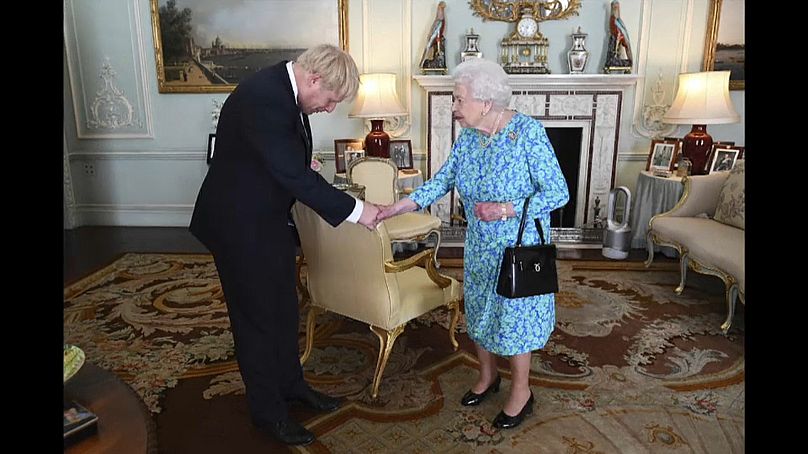Vowing to quit the EU by October 31, he attacked the "doubters, doomsters, gloomsters" who warn over the economic impact of a no-deal Brexit.
Boris Johnson used his first speech as UK prime minister to express confidence over striking a Brexit deal with Brussels.
Vowing to quit the EU by October 31, he attacked the "doubters, doomsters, gloomsters" who warn over the economic impact of a no-deal Brexit.
Johnson succeeded Theresa May after meeting with the Queen at Buckingham Palace earlier on Wednesday.
On Wednesday evening, Johnson unveiled his cabinet of senior ministers — in a major overhaul seen as a ruthless drive to deliver his Brexit objectives.
The main appointments saw ex-home secretary (interior minister) Savid Javid become Chancellor of the Exchequer (finance minister) —while arch-Brexiteers Dominic Raab and Priti Patel return to government, as foreign secretary and home secretary respectively.
Jacob Rees-Mogg, chairman of the hardline pro-Brexit European Research Group, becomes leader of the House of Commons. Other prominent "leavers" such as also Andrea Leadsom, Theresa Villiers and Gavin Williamson all return to government.
READ MORE:
Who got the top jobs in Boris Johnson's new government?
No-deal Brexit: everything you need to know
Brexit Guide: where are we now?
"I pay tribute to the fortitude and patience of my predecessor and her deep sense of public service," said Boris Johnson outside Number 10 Downing Street. "But in spite of all her efforts it has become clear that there are pessimists at home and abroad who think after three years of indecision that this country has become a prisoner to the old arguments of 2016 and in this home of democracy, we are incapable of honouring a democratic mandate.
"And so I am standing before you today to tell you, the British people, that those critics are wrong. The doubters, the doomsters, the gloomsters. They are going to get it wrong again.
"The people who bet against Britain are going to lose their shirts because we're going to restore trust in our democracy. And we are going to fulfil the repeated promises of Parliament to the people and come out of the EU on October the 31st, no ifs or buts."
Johnson, who led the campaign for the UK to leave the EU, also appointed Dominic Cummings, the campaign director of the official Brexit Vote Leave campaign, as a senior adviser in Downing Street.
Cabinet cull
No fewer than 17 ministers who were either full members of, or attended, Theresa May's cabinet, were ousted in the biggest UK government shake-up ever. They included Johnson's leadership rival Jeremy Hunt, who refused an offer to leave his post as foreign secretary to be in charge of defence.
Other surprise departures included prominent "leave" campaigner Liam Fox from international trade, and Penny Mordaunt from defence.
Earlier, several others ruled themselves out of the running, making it clear they opposed the new prime minister and his strategy.
Chancellor of the Exchequer Philip Hammond, May's de facto deputy David Lidington and leadership race surprise package Rory Stewart have all said they will not serve under Johnson.
The key stumbling block is Johnson's willingness to leave the EU without a deal, something a majority of MPs in parliament are against too.
Despite saying he wanted to unite the UK — calling England, Scotland, Wales and Northern Ireland the "awesome foursome" — there are significant challenges facing Johnson. Scotland voted to stay in the EU, while the issue of the Irish backstop remains unchanged.
"Behind all the 'make Britain great again' type rhetoric that speech was rambling, blame-shifting and, to put it mildly, somewhat divorced from reality," wrote Nicola Sturgeon, Scotland's First Minister.
Read more
Who will get the key posts in Boris Johnson's new government?
A list of resignations ahead of Boris Johnson becoming UK PM
European leaders congratulate Johnson but warn of challenging times ahead












